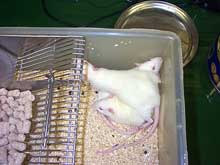Fluoxetine: antidepressant and a possible new drug for the treatment of obesity

Genetically fattened Zucker fa/fa rats <br>© University of the Basque Country
The Department of Nutrition and Bromatology of the Faculty of Pharmacy of Gasteiz, University of the Basque Country, is studying the action mechanism of fluoxetine in genetically fattened rats (Zucker fa/fa). Due to fluoxetine, those rats eat 50 % less. Therefore, the bodies put on less weight and the size of different fat tissues is reduced.
Antidepressants of the type of fluoxetine reduce appetite. More exactly, fluoxetine affects on neuropeptides that regulate appetite. Hence, it is believed that fluoxetine can be used to treat obesity.
After studying the action-mechanism of fluoxetine it has been observed that it reduces the quantity of Y neuropeptide. That peptide is orexigen, it causes appetite. The fluoxetine does hinders the trasport of that peptide, and so appetite is reduced.
That result has lead the scientists of the faculty of pharmacy to study the effect of fluoxetine on melanocortins. Melanocortins are important neuropeptides that control how many food is consumed. Now they are studying the changes that may occur in the operative system of melanocortins, both in MC4-R melanocortin receptors and in a-MSH (alfa melanocyte stimulating hormones) .
Hunger and neuropeptides
Appetite is a feeling that is created in the hypothalamus and its regulation is a complex process that depends on the regulation of neuropeptides, neurotransmitters and several hormones. In that process two types of neuropeptides must be taken into account: orexigens or appetite stimulants and anorexigens or reducers of appetite.
Some of the well-known orexigens are Y neuropeptide, some opioid peptides, endogenous cannabinoid, etc. Among anorexigens CRF (corticotropin releasing factor), CART (cocaine and amphetamine related transcript), melanocortin, galanin and cytokines. All those neuropeptides have effect on the hypothalamus and their interaction causes hunger and satiety.
It is believed that those neuropeptides could be the responsible of disorders such as obesity, anorexia nervosa and bulimia. Nowadays there is no appropriate drug to treat those disorders and some of the cures that have been used are very dangerous and harmful for the health, for example amphetamines. According to the result of this research, who knows if fluoxetine, apart from being an antidepressant, may become a secure drug to treat obesity.
Media Contact
All latest news from the category: Health and Medicine
This subject area encompasses research and studies in the field of human medicine.
Among the wide-ranging list of topics covered here are anesthesiology, anatomy, surgery, human genetics, hygiene and environmental medicine, internal medicine, neurology, pharmacology, physiology, urology and dental medicine.
Newest articles

Properties of new materials for microchips
… can now be measured well. Reseachers of Delft University of Technology demonstrated measuring performance properties of ultrathin silicon membranes. Making ever smaller and more powerful chips requires new ultrathin…

Floating solar’s potential
… to support sustainable development by addressing climate, water, and energy goals holistically. A new study published this week in Nature Energy raises the potential for floating solar photovoltaics (FPV)…

Skyrmions move at record speeds
… a step towards the computing of the future. An international research team led by scientists from the CNRS1 has discovered that the magnetic nanobubbles2 known as skyrmions can be…





















